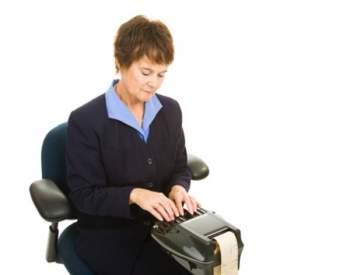
Understanding A Court Reporter

What is a Court Reporter?
A Court Reporter is a licensed and certified professional responsible for the transcription of speech into text taking place within a court hearing or trial.
Court Reporter Certifications
In order to
be certified as a Court Reporter, the following may be investigated by
individuals interested in gaining employment through Stenography:
Registered Professional Reporter (RPR)
A Registered Professional Reporter is considered to be a certification granted to individuals interested in becoming Court Reporters. In order to advance through the field of Court Reporting, this Court Reporter certification must be attained. In order to receive this certification, an applicant must:
Receive a passing grade on the Written Knowledge Test, which gauges the skill of an individual applicant with regard to the expectations of a Court Reporter. The test includes a section that focuses on reporting, the ability to produce transcription of events, the understanding and proficiency with regard to a stenograph machine, and a review of background knowledge and professional acumen;
Produce literary transcription at a rate of 180 words per minute;
Produce Jury Charge transcription at a rate of 200 words per minute;
Produce testimony in a ‘question and answer’ setting at a rate of 225 words per
minute.
National Court Reporters Association (NCRA)
This
Association oversees and regulates the certifications that are granted to
individuals who desire to gain employment through a Court Reporter position.
The NCRA began as an institution specializing in shorthand with regard to the
provision of expedited and accurate transcription of events. The NCRA teaches
the methodology expressed in The Phrase Book of Pitmanic Shorthand with regard
to the authorized transcription of legal and medical proceedings.
Stenograph
A Stenograph machine, also called a Stenotype machine, is a machine resembling a typewriter that is used by a Court Reporter for the purpose of transcription. Unlike a traditional typewriter, a stenograph machine contains only 25 keys and does not operate on a traditional keyboard format such as ‘QWERTY’. In lieu of a traditional keyboard, stenotypes allow a court reporter to transcribe common phrases and articles rather than individual letters and characters.
Due to the
fact that typical transcription can involve events that range from 100 to 300
words recited per minute, a Court Reporter must maintain the ability to
accurately transcribe the speech of an event in real time. The stenograph
machine was patented in 1879 and currently varies in sale price. These prices
range from $500 to $7,000 USD.
Chording
Chording is
a typing method utilized by a Court Reporter allowing them to adequately and
accurately press multiple keys in a single stroke. This allows them to
transcribe whole words in lieu of typing the word in a ‘letter-by-letter’
fashion. Chording also allows a Court Reporter to maintain accurate
transcription in the means of ‘real time’ transcription.
Additional Court Reporter Certifications
The following are additional certifications that can be earned in the profession of Court Reporting. These certifications vary upon location and requirements with regard to their respective attainment:
Certified CART Provider (CCP)
Certified Broadcast Captioner
(CBC)
Certified Realtime Reporter
(CRR)
Registered Merit Reporter
(RMR)
Federal Certified Realtime
Reporter (FCRR)
Registered Diplomate Reporter
(RDR).